Lee Lai-shan thrilled by Cheung Ka-long’s gold medal – after 25 years, ‘Hong Kong athletes are not rubbish’ cry holds true
- Hong Kong’s first-ever Olympic champion, who won the windsurfing title in Atlanta 1996, hopes for more gold from the squad at Tokyo Games
- The queen of Hong Kong sport says she hopes the government will pour more resources into sporting facilities in the city after Cheung’s victory

Follow our live coverage of day four of the Tokyo Olympics here
When windsurfer Lee Lai-shan won the first-ever gold medal for Hong Kong at the 1996 Atlanta Olympics, she was already thinking about who would be the city’s next champion – hoping her heroics off the Georgia coast would inspire a new generation of elite athletes.
It may have taken a quarter of a century but the 24-year-old Cheung, the son of two former basketball players, proved that San San’s iconic line after she won gold in Atlanta – “Hong Kong athletes are not rubbish” – was true with his gold medal on Monday.
“I am so happy that after 25 years, there is finally another Hong Kong gold medallist,” Lee told the Post. “And I hope there is more to come in Tokyo. We are all very proud of Edgar and Hong Kong people should be proud of him.
“I said when I won gold in Atlanta that ‘Hong Kong athletes are not rubbish’, and Edgar has proved that. Not only him but we have so many athletes who work so hard and are top 10 or top 20 in the world and this is something to be proud of.